

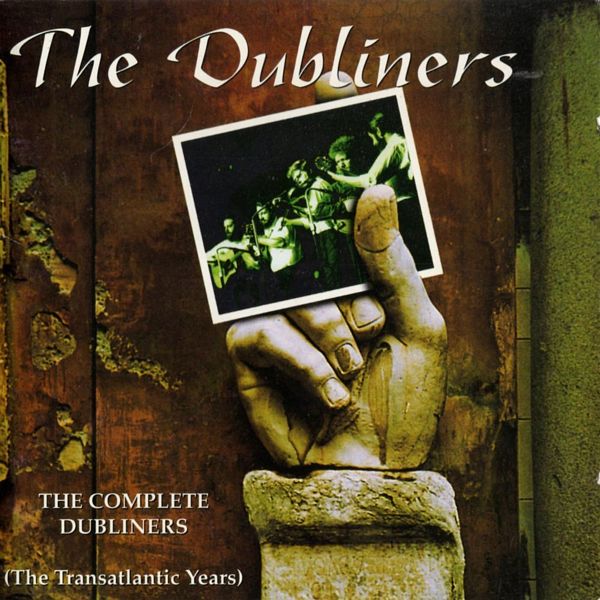 |
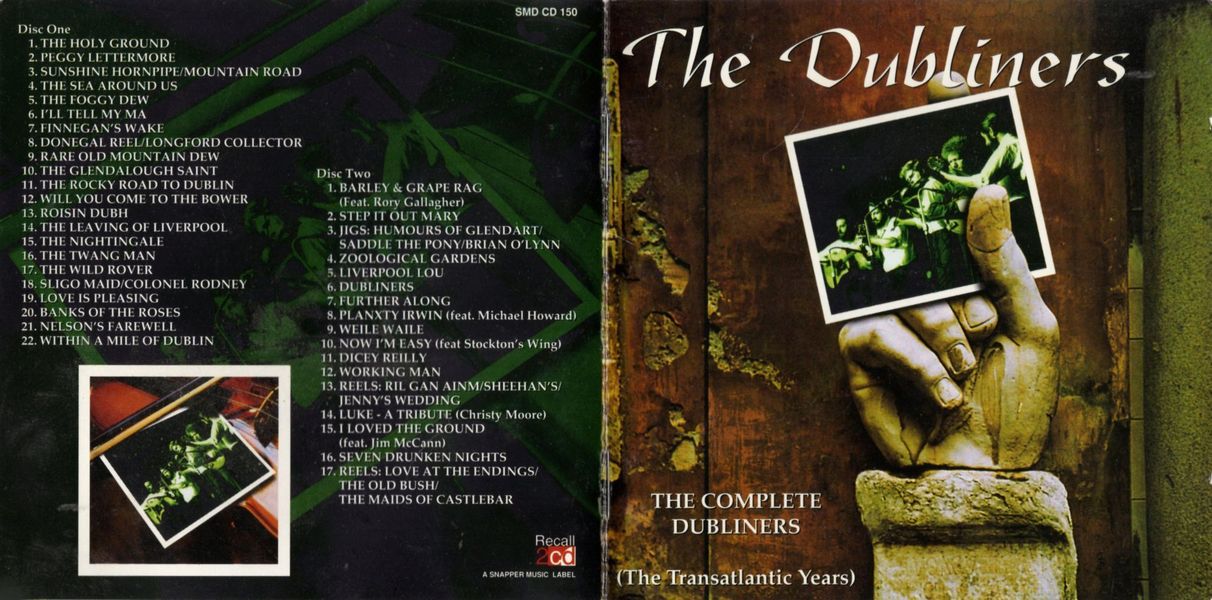
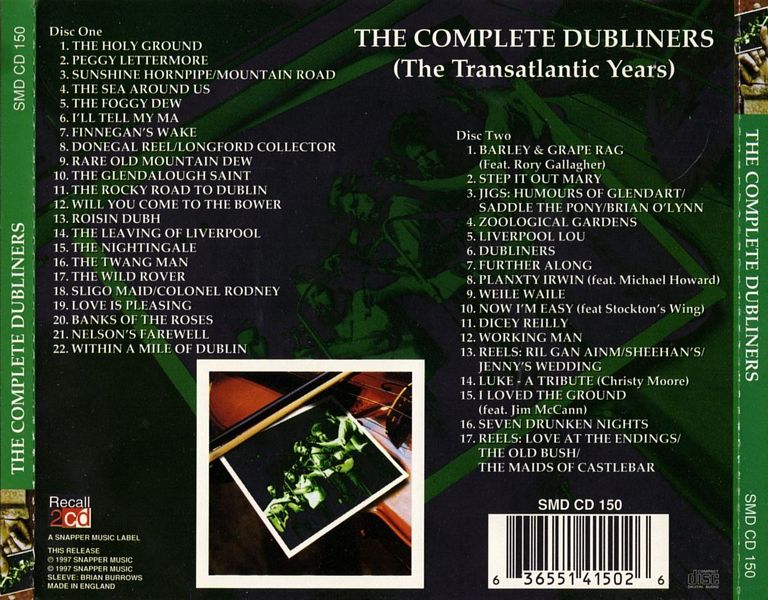 |
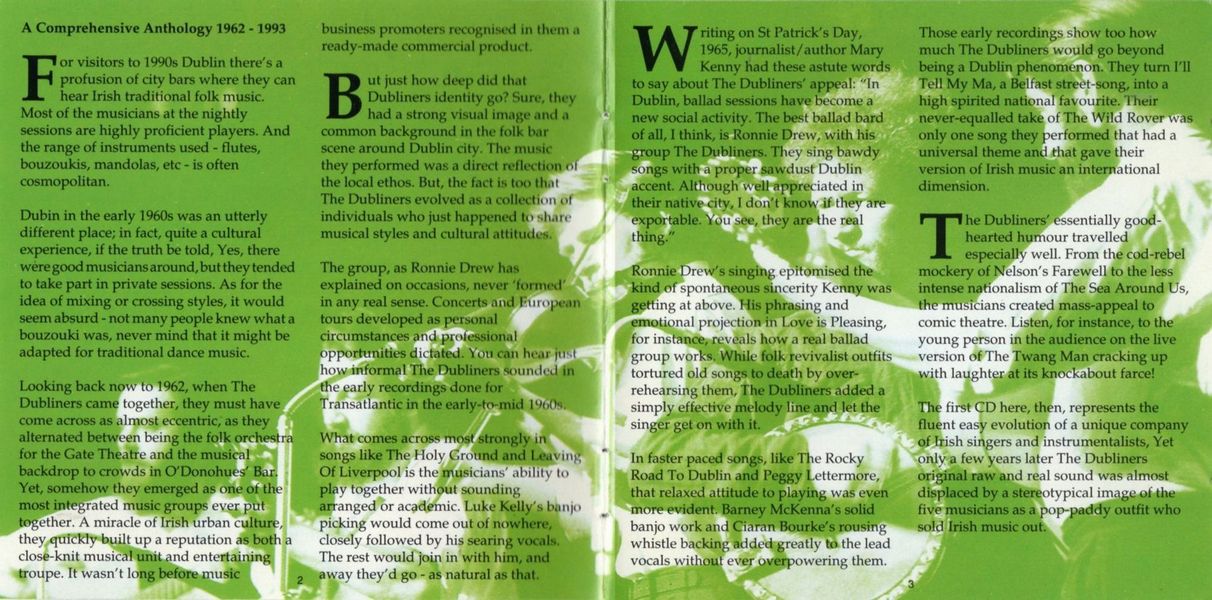
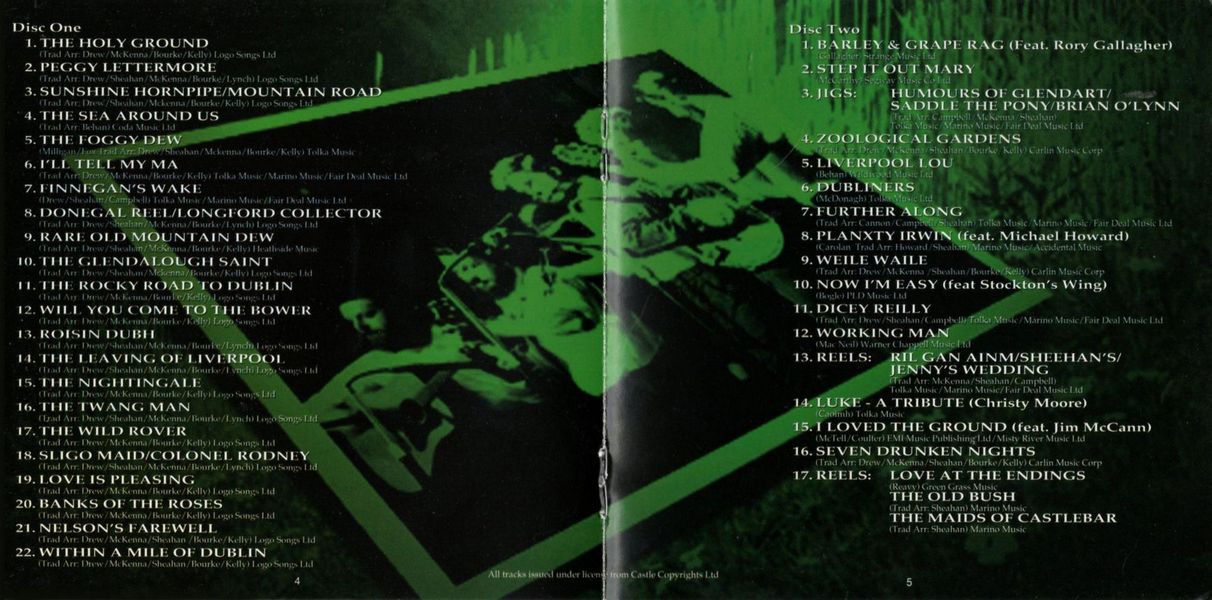 |

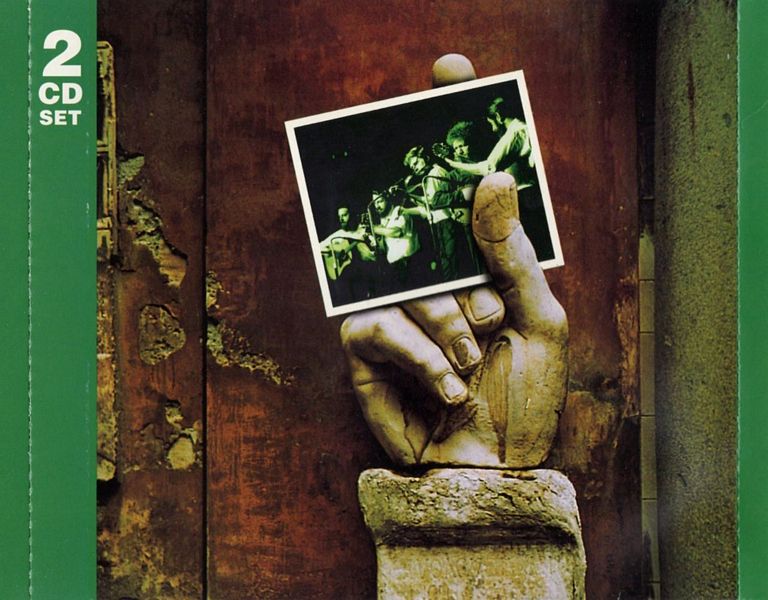 |
Sleeve Notes
A Comprehensive Anthology 1962-1993
For visitors to 1990s Dublin there's a profusion of city bars where they can hear Irish traditional folk music. Most of the musicians at the nightly sessions are highly proficient players. And the range of instruments used — flutes, bouzoukis, mandolas, etc — is often cosmopolitan.
Dublin in the early 1960s was an utterly different place; in fact, quite a cultural experience, if the truth be told, Yes, there were good musicians around, but they tended to take part in private sessions. As for the idea of mixing or crossing styles, it would seem absurd — not many people knew what a bouzouki was, never mind that it might be adapted for traditional dance music.
Looking back now to 1962, when The Dubliners came together, they must have come across as almost eccentric, as they alternated between being the folk orchestra for the Gate Theatre and the musical backdrop to crowds in O'Donohues' Bar. Yet, somehow they emerged as one of the most integrated music groups ever put together. A miracle of Irish urban culture, they quickly built up a reputation as both a close-knit musical unit and entertaining troupe. It wasn't long before music business promoters recognised in them a ready-made commercial product.
But just how deep did that Dubliners identity go? Sure, they had a strong visual image and a common background in the folk bar scene around Dublin city. The music they performed was a direct reflection of the local ethos. But, the fact is too that The Dubliners evolved as a collection of individuals who just happened to share musical styles and cultural attitudes.
The group, as Ronnie Drew has explained on occasions, never 'formed' in any real sense. Concerts and European tours developed as personal circumstances and professional opportunities dictated. You can hear just how informal The Dubliners sounded in the early recordings done for Transatlantic in the early-to-mid 1960s.
What comes across most strongly in songs like The Holy Ground and Leaving Of Liverpool is the musicians' ability to play together without sounding arranged or academic. Luke Kelly's banjo picking would come out of nowhere, closely followed by his searing vocals. The rest would join in with him, and away they'd go — as natural as that.
Writing on St Patrick's Day, 1965, journalist/author Mary Kenny had these astute words to say about The Dubliners' appeal: "In Dublin, ballad sessions have become a new social activity. The best ballad bard of all, I think, is Ronnie Drew, with his group The Dubliners. They sing bawdy songs with a proper sawdust Dublin accent. Although well appreciated in their native city, I don't know if they are exportable. You see, they are the real thing."
Ronnie Drew's singing epitomised the kind of spontaneous sincerity Kenny was getting at above. His phrasing and emotional projection in Love is Pleasing, for instance, reveals how a real ballad group works. While folk revivalist outfits tortured old songs to death by over rehearsing them, The Dubliners added a simply effective melody line and let the singer get on with it.
Seven Drunken Nights, released in 1967, was a great comic epic, a huge commercial success, and put Irish folk music into a whole new perspective. Yet, it also marked the start of a phase for the group which would identify them as hard-drinking rowdy celts who seemed more at home playing in bars than concert venues. And a series of high-charting singles and albums reinforcing that idea followed in quick succession.
The Dubliners themselves were happy enough to be equally defined and restricted for a while by this drinkin' and coortin' label. But when Irish traditional music took a turn for the sophisticated in the 1970s, The Dubliners began to look like the musicians that culture forgot. And, when Luke Kelly and Ciaran Bourke both died in the 1980s it looked as if the group was finished.
Yet, after members of The Pogues and The Dubliners got together at an Austrian festival in 1987 the lifeforce that informed the Dubliners of 1962 was rekindled. (Maybe Shane McGowan recognised in them the same individuality that brought The Pogues out from the backrooms of London Irish bars into the public eye). When both outfits collaborated on The Irish Rover project it marked an important turning point for The Dubliners, as you'll hear in the opening track — Barley And Grape Rag — of the second CD.
Country blues and ragtime are not genres associated with The Dubliners. But in Barley and Grape Rag, the group proves more than able to enhance Rory Gallagher's reading of this traditional blues song. Gallagher's flat-picking dobro playing is interspersed with John Sheahan's convincingly jazzy violin work. Sharing the vocal lines, Gallagher and Drew get to the heart of the song's free-spirited theme.
As well as reestablishing that The Dubliners were always more than just a bunch of musicians who hung out together in Dublin, the 1987 project opened the doors to a series of collaborations. It's appropriate, for instance, that Stockton's Wing joined them on Now I'm Easy: the band's backdrop of mostly stringed instruments is similar to that of The Dubliners.
Jim McCann, the group's temporary vocalist in the 1970s, lends I Love The Ground She Walked Upon the sort of restrained treatment that characterised many Dubliners ballads. Christy Moore's Luke — A Tribute is included here for its plain directness: a style often associated with both Luke and his fellow group members.
In 1988, Dubliner's Dublin, a parallel video and CD project, was recorded. Intended as a tribute to the city itself, the album's songs work as a bridge back to the middle period of The Dubliners' career. Three from that time are included in this collection. Weile Waile, a potentially grim murder ballad, is transformed into a black comic singalong. Dicey Reilly and Zoological Gardens are now legendary traditional Dublin songs.
Best known for the charisma of singers Ronnie Drew and Luke Kelly, it's easy to undervalue the instrumentalists in the band. Barney McKenna is one of the finest banjo players in the world, a claim immediately verified by listening to his grace-note work on Within A Mile Of Dublin. John Sheahan's majestic fiddle playing rightly dominates the Sunshine Hornpipe/Mountain Road track. Transposing the slow air Roisin Dubh to Italian mandolins, Barney and John were years ahead of the 1970s trend for exotic non-Irish instruments.
Ronnie Drew, John Sheahan and Barney McKenna work on as the nucleus of the original group. For many of their long-time fans, there's a tinge of sadness that the 1962 line-up didn't survive intact. Yet the remaining Dubliners are philosophical about whether the group ever set out to have a commercial future in the first place. Asked in a 1992 interview if they'd ever come close to splitting up, Ronnie Drew laughed and said "Every week!"
The first CD of this compilation, then, is a retrospective of the remarkable three years, (1962-1965), when The Dubliners played, toured, drank and gave up their day jobs and had the good times bringing Irish folk music to the international masses. The second one also shows how the central concept of the group has been kept alive by the open-mindedness of its versatile founding members and the enthusiastic input of the best of 1990s folk and acoustic musicians.
Michael O'Hanlon — July 1997